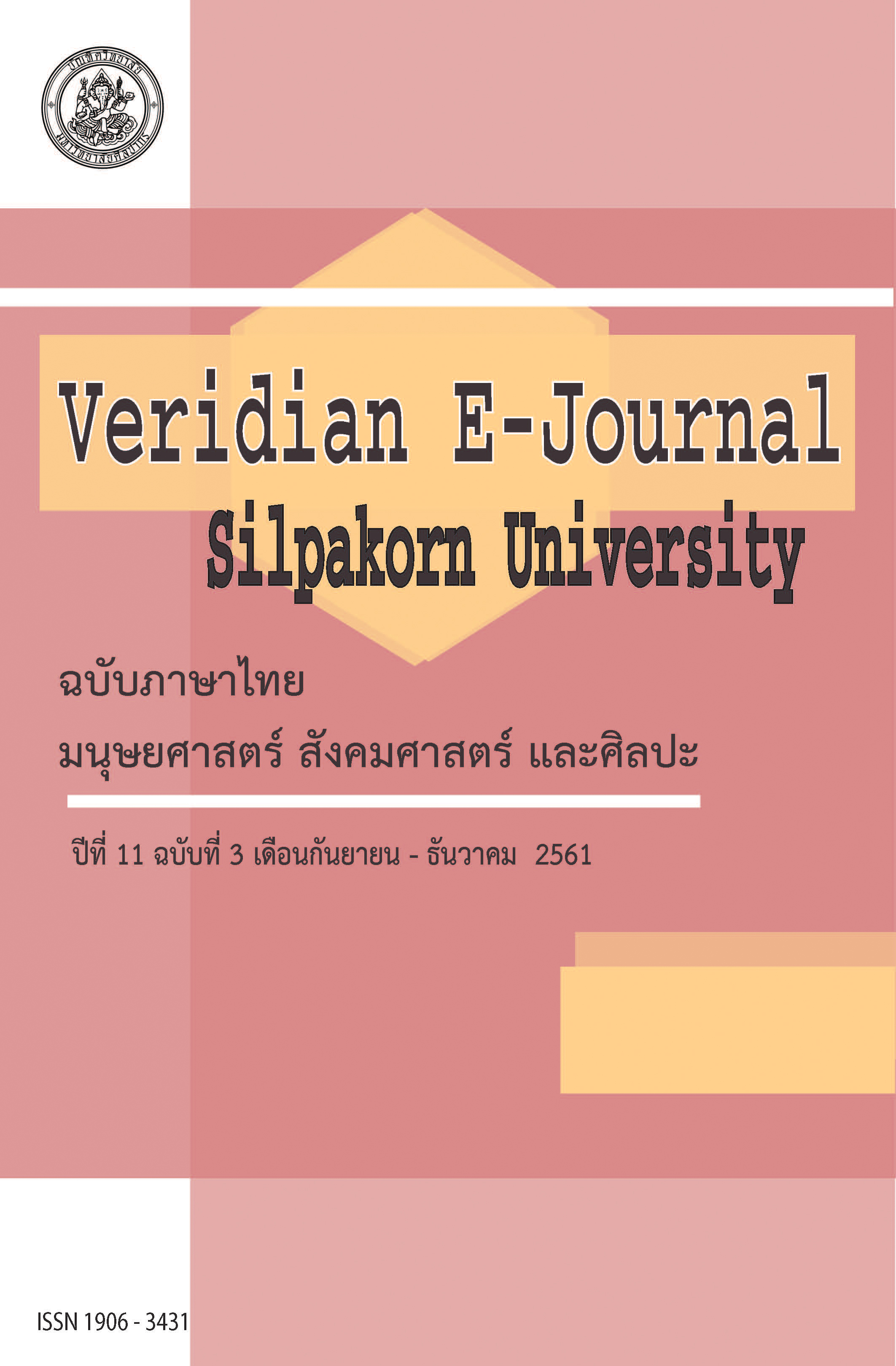บทบาทของสื่อไทยในการเปลี่ยนแปลงทางการเมือง (The Role of Thailand’s Media in the Political Transformation)
Main Article Content
Abstract
บทความวิจัยเรื่อง บทบาทของสื่อไทยในการเปลี่ยนแปลงทางการเมือง มีวัตถุประสงค์เพื่อศึกษาบทบาทของสื่อไทยในกรณีการเลือกตั้งทั่วไป 2 กุมภาพันธ์ 2557 และกรณีรัฐประหาร 22 พฤษภาคม 2557 ใช้ทฤษฎีอำนาจของสื่อในระบบสื่อสารการเมืองของไมเคิล กูเรวิทช์ (Michael Gurevitch) และเจย์ บลูมเลอร์ (Jay Blumler) วิเคราะห์การแสดงบทบาททางการเมืองของสื่อ 3 ประเภท คือ สื่อสิ่งพิมพ์ ได้แก่ ไทยรัฐ มติชน และบางกอกโพสต์ สื่อโทรทัศน์ ได้แก่ ททบ. 5 ไทยพีบีเอส และวอยซ์ทีวี และสื่อออนไลน์ ได้แก่ ประชาไท และไทยพับลิก้า
ผลการศึกษาพบว่า สื่อกลุ่มตัวอย่างแบ่งขั้วเลือกข้างในสถานการณ์วิกฤตทางการเมือง กรณีการเลือกตั้ง 2 กุมภาพันธ์ 2557 มติชน วอยซ์ทีวี และประชาไท แสดงบทบาทเป็นผู้ชี้นำ มีจุดยืนสนับสนุนการเลือกตั้ง บางกอกโพสต์แสดงบทบาทเป็นคนกลาง ส่วนไทยรัฐ และ ททบ. 5 แสดงบทบาทเป็นสุนัขเฝ้าบ้าน มีน้ำเสียงไม่สนับสนุนการเลือกตั้ง แต่ไม่แสดงท่าทีอย่างเปิดเผย ขณะที่ไทยพีบีเอส และไทยพับลิก้าแสดงบทบาทสุนัขเฝ้าบ้านมีจุดยืนเป็นคนกลาง ส่วนกรณีรัฐประหาร 22 พฤษภาคม 2557 พบว่า มติชน วอยซ์ทีวี และประชาไท แสดงบทบาทเป็นผู้ชี้นำ มีจุดยืนเลือกข้างไม่สนับสนุนการรัฐประหาร บางกอกโพสต์แสดงบทบาทเป็นคนกลาง ทั้ง 4 องค์กร เป็นสื่อที่มีจุดยืนทางการเมืองที่ชัดเจนและคงเส้นคงวาทั้ง 2 กรณี ส่วนไทยรัฐแสดงบทบาทสุนัขเฝ้าบ้าน แต่มีท่าทียอมรับความจำเป็นในการรัฐประหาร ขณะที่ ททบ. 5 เปลี่ยนไปแสดงบทบาทชี้นำทางการเมืองและสนับสนุนรัฐประหาร สำหรับไทยพีบีเอสแสดงบทบาทสุนัขเฝ้าบ้าน มีท่าทีไม่สนับสนุนรัฐประหาร ส่วนไทยพับลิก้าแสดงบทบาทสุนัขเฝ้าบ้าน มีจุดยืนเป็นคนกลางในตอนแรก ต่อมาค่อย ๆ เปลี่ยนเป็นไม่สนับสนุนการรัฐประหาร ข้อค้นพบดังกล่าวแสดงให้เห็นว่า สื่อไทยไม่ได้แสดงบทบาทตรงไปตรงมาหรือชัดเจนตายตัว แต่มีลักษณะเลือกข้างที่หลากหลาย เป็นผลจากเงื่อนไขความไม่มีเสถียรภาพทางการเมืองและการแข่งขันทางเศรษฐกิจทำให้ต้องปรับตัวเพื่อความอยู่รอด
This article adopts the approach of media power in the political communication system introduced by Michael Gurevitch and Jay Blumler to analyze the role of Thailand’s media in political transformation, a period of time in which Thailand had the 2014 general election and coup d'état. The study will investigate the role of three principal categories of media, viz the print media, (Thairath, Matichon, and Bangkok Post), the broadcast media (Channel 5, ThaiPBS, and VoiceTV), and the online media; (Prachatai and Thaipublica).
During the election it is found that Matichon, VoiceTV, and Prachatai play an editorial guide role in supporting the election while Bangkok Post positions itself as a moderator. However, Thairath and Channel 5 act as the public watchdog, by implication, and do not advocate election. For ThaiPBS and Thaipublica, they have a watchdog role of the government as well as keep silent whether they protest against the election. In the military coup in 2014 Matichon, VoiceTV and Prachatai are explicitly against the coup. Bangkok Post acts as a moderator. This shows that these four news organizations play its role in both political cases clearly and consistently. On the contrary, albeit considered a watchdog Thairath seems to accept that the coup is needed to solve political problems. Channel 5 expresses its political standpoint through taking a more active role of backing the coup whereas ThaiPBS functions as a watchdog against the coup. It is interesting that Thaipublica has changed its role from a watchdog remaining politically neutral to oppose the coup. These research findings show that there is an oscillation in the role of Thailand’s media. The so-called “partisan polyvalence” strategy is hence used by Thai media to fight for survival in political instability and economic competition.

